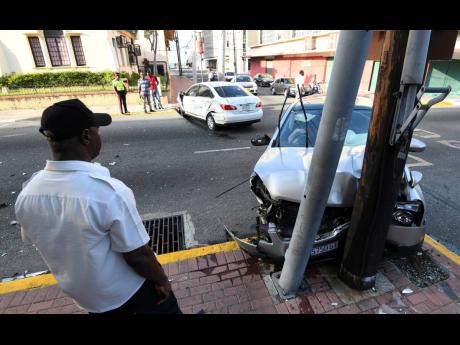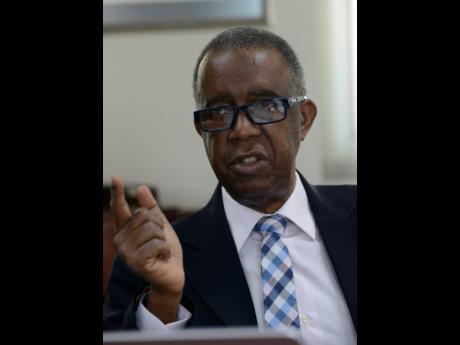Editors' Forum | Road Safety Council out of fuel - Funding shortfall cripples public education campaign
The National Road Safety Council (NRSC) is $90 million short of the funds it needs to conduct a sustained and effective campaign to raise awareness about traffic crashes and influence driver behaviour to stem the carnage on Jamaica’s streets.
With crash deaths at 164 as at Thursday, May 16, trending higher than the corresponding period last year, vice-chairman of the NRSC, Dr Lucien Jones, said the traffic lobby has only a tenth, or $10 million, of the optimum spend it needs for public-education programmes, despite having Prime Minister Andrew Holness as its chairman.
Jones, who was speaking at a Gleaner Editors’ Forum last week, said the sum would be needed for a “sustained public-education programme” on the scale of blitzes on HIV, dengue, sugary drinks, and chikungunya.
But state minister in the Ministry of Education, Alando Terrelonge, drew the ire of forum guests when he said that the NRSC was failing to carry out its stated mandate, apparently oblivious of the NRSC’s budgetary constraints.
“If we are going to deal with the second leading cause of death in Jamaica, second to murder only, in the age cohort internationally between five and 30; if we are going to tackle the eighth leading cause of death across the world, it is going to cost money,” said Jones, amid stone-faced forum guests, peeved by Terrelonge’s assertion.
“We need an estimated $100 million for a proper public-education campaign,” Jones said.
‘No silver bullet to road safety’
Veteran road-safety campaigner Dr Lucien Jones says that the National Road Safety Council (NRSC) is trying to get the International Road Assessment Programme (IRAP) to come to Jamaica for an evaluation of what it would take to raise the standard of roads here from one-star to three-star.
Jones, who is the vice-chairman of the NRSC, said that the World Health Organisation’s recommendation is that every country should have three-star status. That evaluation comes with an estimated price tag of about US$250 million.
Government will have to foot the cost of that evaluation, he said.
With a multibillion-dollar effect on the health sector, traffic crashes put tremendous pressure on the public budget, tallying up to five per cent of GDP, inclusive of its effect on productivity.
Jones, though, is trying to drum up support for state or private intervention.
“As road-safety managers, we want you to encourage the country for us that there is no silver bullet to road safety, and it involves many different groups and people taking action to make it work. There is no getting away from the fact that it is going to cost money. There is no free lunch when it comes to road safety ... ,” he said.
“When you look at the sugary drinks campaign and the frequency with which those adverts came, the HIV advert, ‘get on with your meds’, that advert everybody can recite from front to back, we don’t have that kind of funding to put out that quality of public education. So we need huge sums of money, not only from the Government, but from the private sector. We have approached them, and so far, we have not gotten the kind of response we need to get,” he said.
Jones told The Gleaner that in 25 years, the NRSC has not reported to any overarching body, a paradigm he is intent on changing. He is also pushing for the entity to become a commission of Parliament, which would raise its profile and structure, preparing the platform for better financing.
The prime minister said that he has asked for the body to present a paper to him for consideration. It should be completed in three months.


